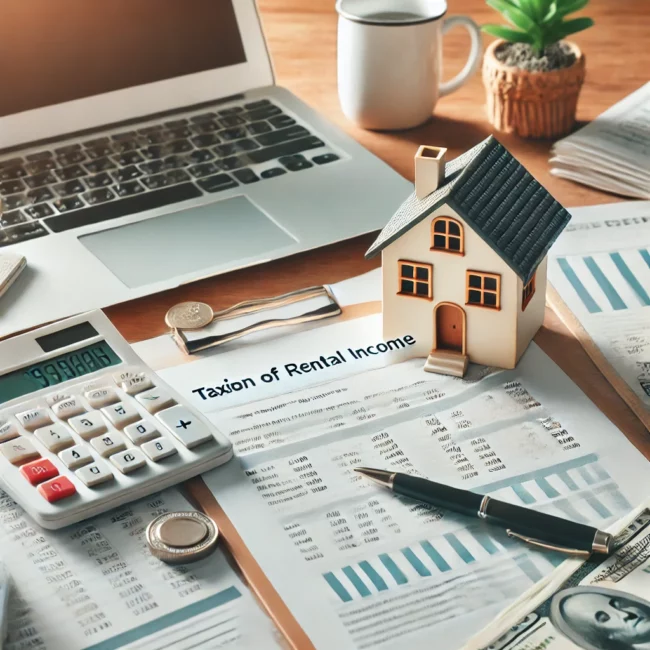Are you a French expatriate owning rental properties in France, wondering how your income from property is taxed as a non-resident? Do you want to avoid double taxation and ensure compliance with French tax laws? Understanding the taxation of property income is crucial for non-resident French expatriates, and this guide will walk you through the complexities.

What's the impact of tax treaties on your property income?
As a non-resident French expatriate, you’ll need to navigate international tax treaties, choose the right tax regime for your property income, and comply with French tax reporting requirements. But don’t worry, we’ve got you covered. In this article, we’ll explore the key aspects of taxation for non-resident French expatriates, including:
- Tax treaties and double taxation
- Tax regimes for rental income
- Tax implications for empty vs. furnished properties
- Social security contributions
- Declaration requirements
The hardest thing in the world to understand is the income tax. — Albert Einstein, The Saturday Evening Post, 1935
How do you avoid double taxation?
To avoid double taxation, it’s essential to check if there’s a tax treaty between France and your host country. If a treaty exists, France may allow a deduction of tax paid in the country of origin. Without a treaty, you risk being taxed twice on the same income. Tax treaties aim to combat tax evasion and ensure that expatriates aren’t unfairly taxed. You can find more information on tax treaties on the OECD website.
What's the best tax regime for your rental income?
France offers two tax regimes for property income:
- Micro Regime: Applies automatically if rental income doesn’t exceed certain thresholds (€15,000 for empty properties and €82,200 for furnished properties in 2023). You’ll declare gross rental income and apply a 30% allowance for expenses under the micro-foncier scheme or 50% under the micro-BIC scheme for furnished properties (71% for classified furnished tourist accommodation).
- Real Profit Regime: Allows deducting actual expenses, potentially creating a property deficit and reducing tax liability. This scheme is irrevocable for 3 years.
If you’re considering setting up a company in France, it’s essential to understand the tax implications of your business structure. Our company setting-up page provides valuable insights into the process.
What's the tax impact of renting out empty vs. furnished properties?
The type of rental property affects the applicable tax regime:
- Empty Properties: Rental income is considered property income and may be subject to the micro-foncier system or the actual system.
- Furnished Properties: Rental income is considered industrial and commercial profits (BIC) and may be subject to the micro-BIC scheme or the actual scheme. Under the actual scheme, you can deduct various expenses and depreciation, and if you make a loss, you can carry the loss forward.
The tax code is a complex and ever-changing landscape. It’s essential to stay informed and seek professional advice to ensure compliance. — François Lefebvre, Lefebvre Dalloz
How do you calculate your tax liability as a non-resident?
As a non-resident, your French-source rental income is subject to tax. The tax rate may be calculated according to the progressive income tax scale or a minimum rate, depending on the applicable tax treaty. You may also request that the average tax rate be applied if this is more favorable to you. Our tax assistance services can help you navigate the complexities of French taxation.
What about social security contributions?
Non-residents pay social security contributions in France unless affiliated with a compulsory social security scheme in an EEA country. Contributions are set at 17.2%, except in French overseas departments, where they’re 14.4%. However, residents of EEA countries may be exempt from some contributions. For more information on social security contributions, visit the Urssaf website.
How do you declare your property income?
As a non-resident, you’ll declare your property income in the year following your departure abroad. The declaration process varies depending on the tax regime and rental type. You’ll also need to declare income from SCI shares. Make sure to keep accurate records and consult a tax professional if needed. If you’re dealing with business and commercial issues in France, our business and commercial issues page provides valuable insights and guidance.
Key takeaways for non-resident French expatriates
To navigate the complexities of French taxation as a non-resident expatriate:
- Understand international tax treaties and their implications
- Choose the appropriate tax regime for your property income
- Comply with French tax reporting requirements
- Consider consulting a tax professional to ensure you’re meeting all your tax obligations
By following these guidelines, you’ll be better equipped to manage your tax obligations and avoid potential penalties. For more information on the expatriate tax regime, visit the French government website.
Get the expert guidance you need to navigate French tax law
My French Lawyer connects you with a network of experienced lawyers who specialize in French property law and taxation. Our platform empowers you to find the right lawyer for your specific needs, providing personalized guidance and expert advice on the tax implications of your property income in France. Whether you’re a property owner, investor, or expatriate, our partner lawyers will help you navigate the complexities of French tax law, ensuring that your interests are protected and your tax obligations are met.
If you’ve found our article on taxation of property income for non-resident French expatriates relevant to your situation, we’d be happy to help. Contact us today to connect with a lawyer who can provide personalized advice and expert guidance tailored to your needs.